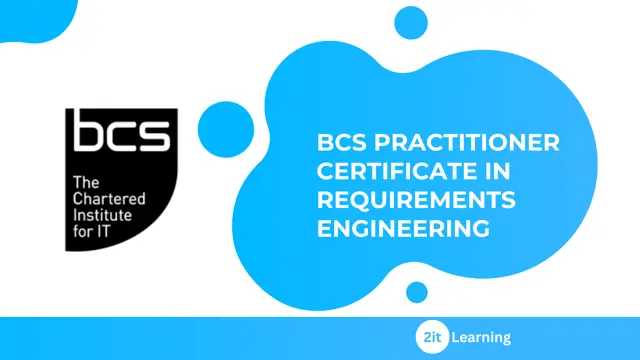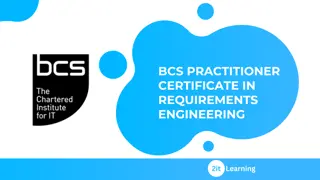
BCS Practitioner Certificate in Requirements Engineering
Summary
- Reed Courses Certificate of Completion - Free
Add to basket or enquire
Overview
- Learn how to take a best practice approach to defining business requirements
- Develop a set of practices and processes to identify requirements in order to develop and design business solutions
- Techniques to engage with stakeholders and draw out information to define requirements
- Attain one of the four modules you need to gain the International Diploma in Business Analysis, which follows entry onto the professional registration for IT technicians (RITTech)
Certification
BCS Practitioner Certificate in Requirements Engineering
Certificates
Reed Courses Certificate of Completion
Digital certificate - Included
Will be downloadable when all lectures have been completed.
Curriculum
-
Introduction to the course 00:52
-
Define Requirements Approach and Project Scope 29:28
-
Elicit Requirements 1:16:14
-
Record Requirements (Documentation) 40:33
-
Build Models and Prototypes to Represent the Requirements 23:06
-
Collaborate and Communicate with Stakeholders to Clarify Requirements 22:38
-
Analyse, Prioritise and Assure the Quality of Requirements 27:52
-
Conduct User analysis and Profiling 11:27
-
Requirements Management and Traceability 21:24
-
Practice Exam 57:00
Course media
Description
What will I learn?
This certificate was updated (July 2021) as a part of our aim to continuously improve the quality of learning within our professional certifications. This update allows BCS to remain at the forefront of best practice industry standards for professional certifications. In the updated BCS Practitioner Certificate in Requirements Engineering you’ll learn how to take a systematic approach to eliciting, defining, analysing, validating, documenting and managing requirements.
The certificate includes:
The Requirements Engineering Framework
How to elicit requirements and techniques to use
How to collaborate and communicate with stakeholders in the requirements process
How to write a user story
Best practice approaches to document requirements
How to manage requirements
Validating, prioritising and quality assurance in the requirements process
Analysing and evaluation of requirements
Who is this course for?
Who is it for?
This practitioner certificate is designed for people who want to gain an understanding of the role that business, customer and requirements play within professional business contexts
Suitable for business analysts, project managers, systems analysts, product owners, product managers and those involved in business change processes and/or projects
Requirements
There are no pre-requisites for this certification.
Questions and answers
Currently there are no Q&As for this course. Be the first to ask a question.
Reviews
Currently there are no reviews for this course. Be the first to leave a review.
Provider
Legal information
This course is advertised on Reed.co.uk by the Course Provider, whose terms and conditions apply. Purchases are made directly from the Course Provider, and as such, content and materials are supplied by the Course Provider directly. Reed is acting as agent and not reseller in relation to this course. Reed's only responsibility is to facilitate your payment for the course. It is your responsibility to review and agree to the Course Provider's terms and conditions and satisfy yourself as to the suitability of the course you intend to purchase. Reed will not have any responsibility for the content of the course and/or associated materials.


